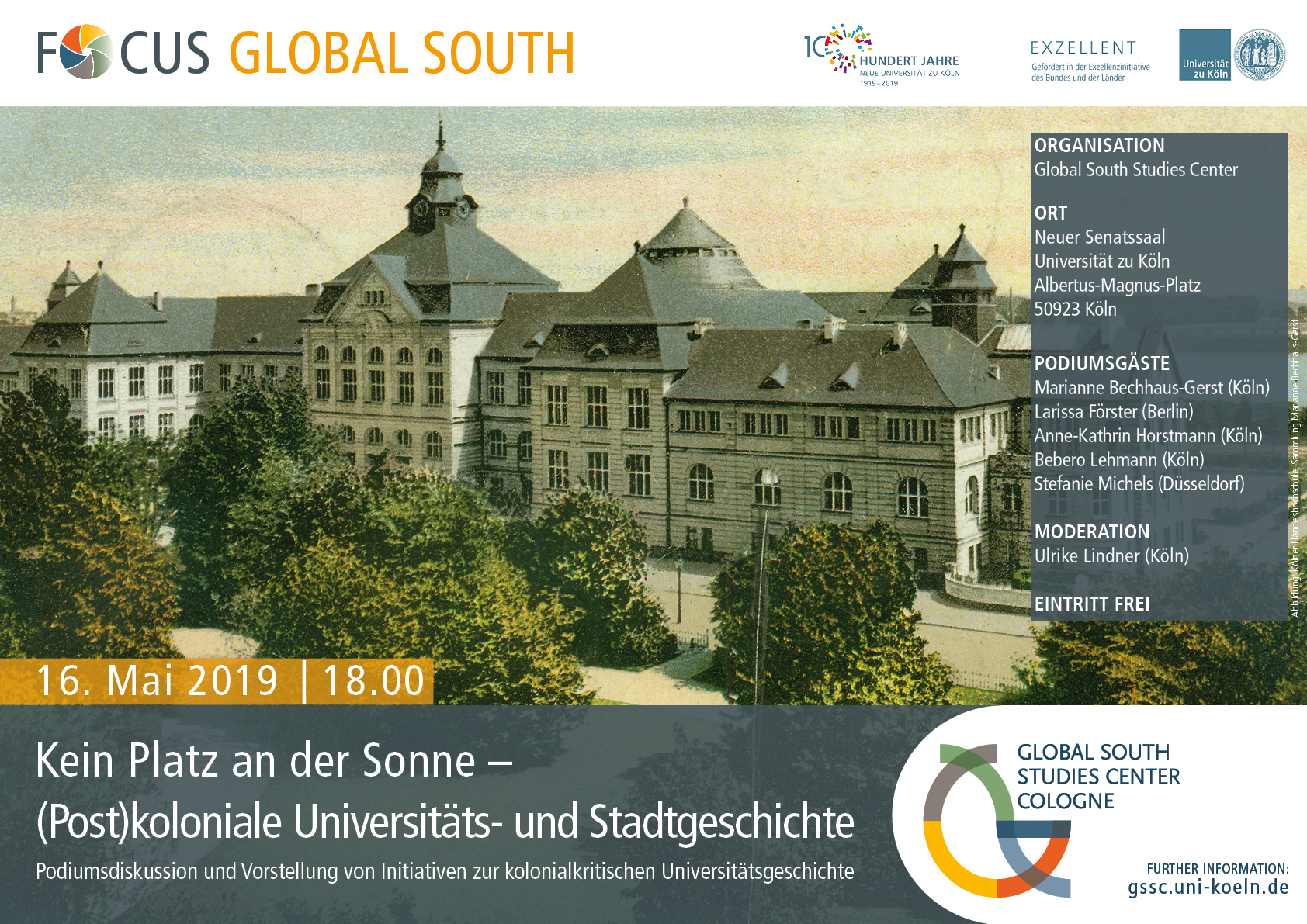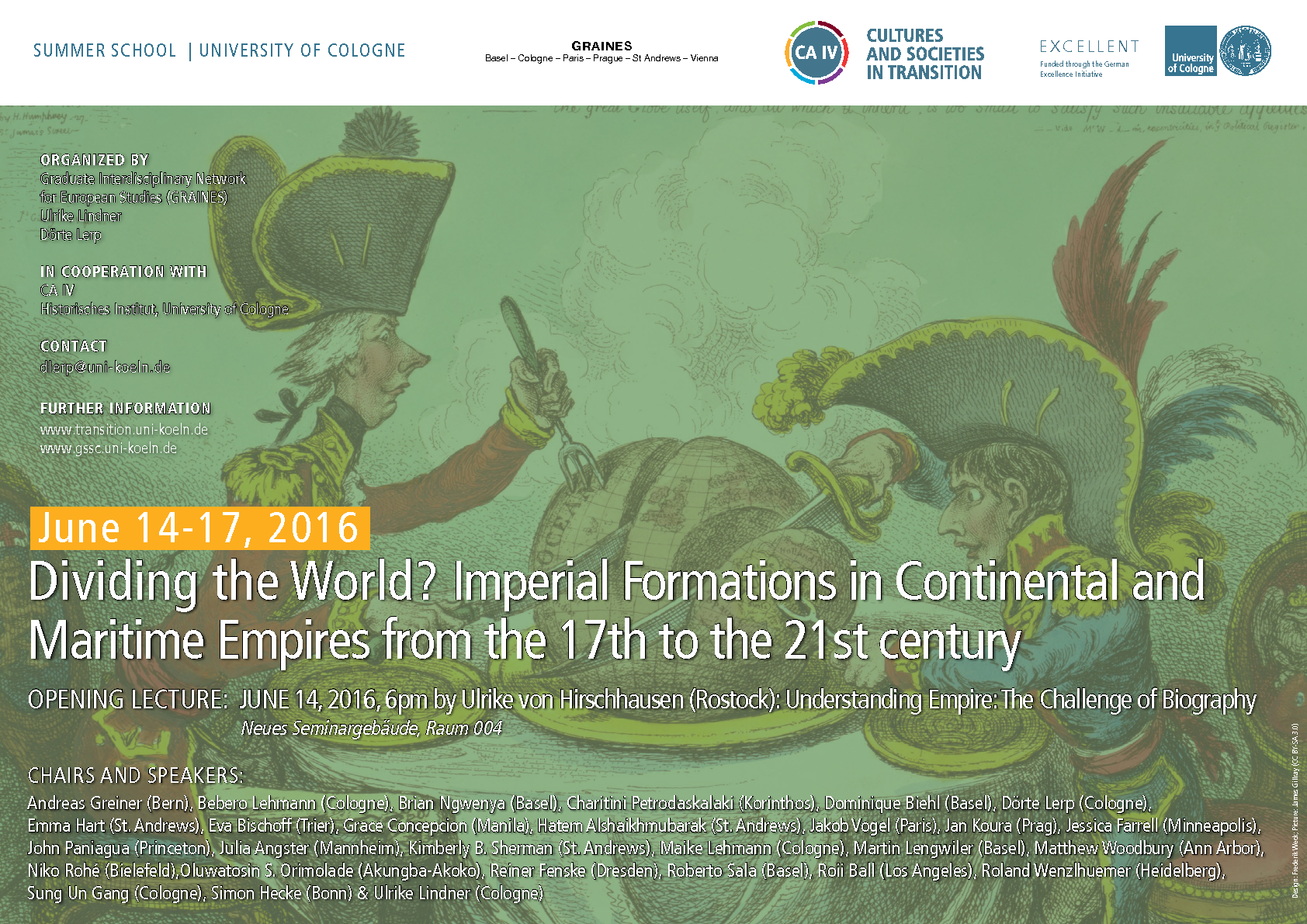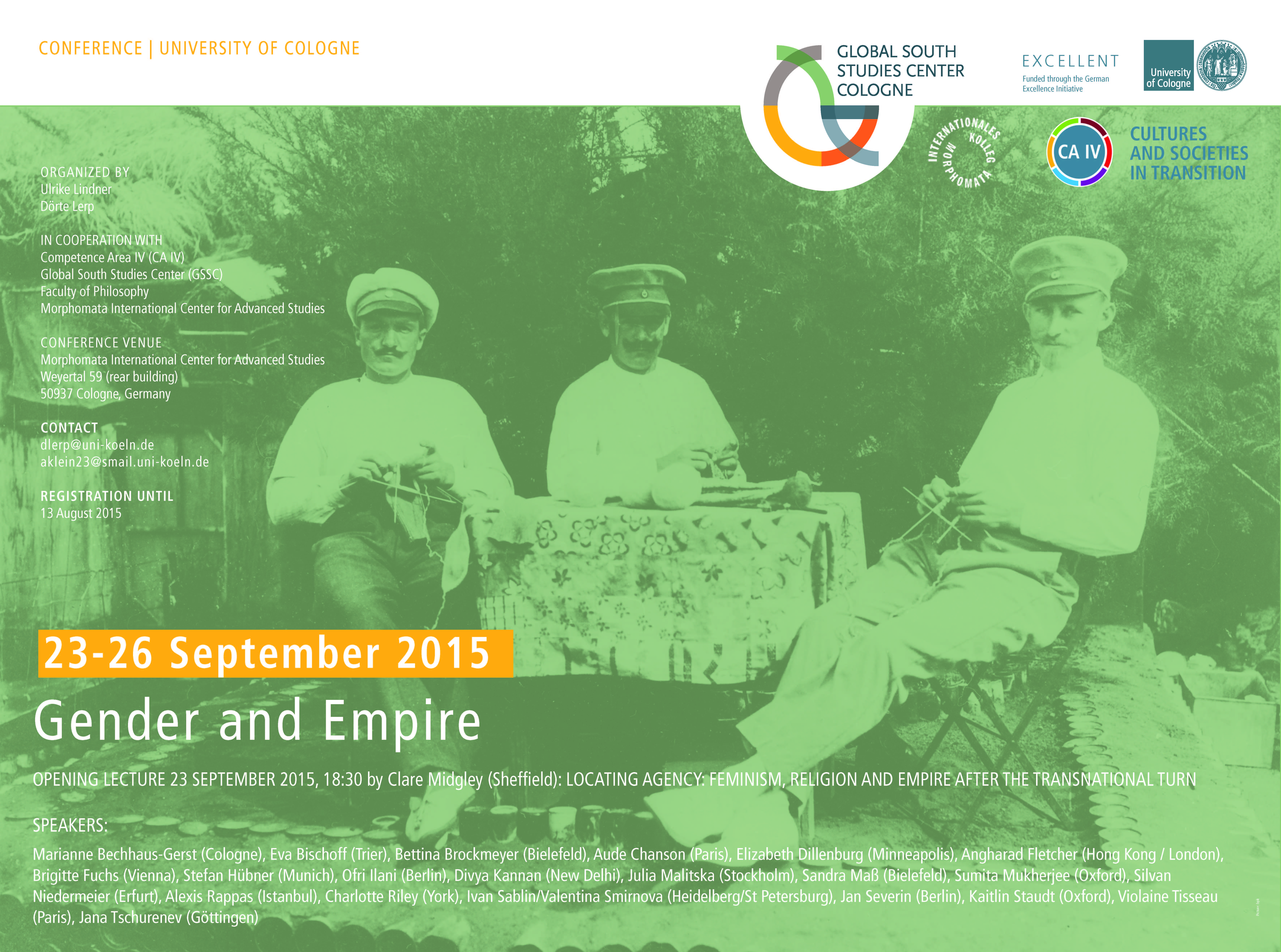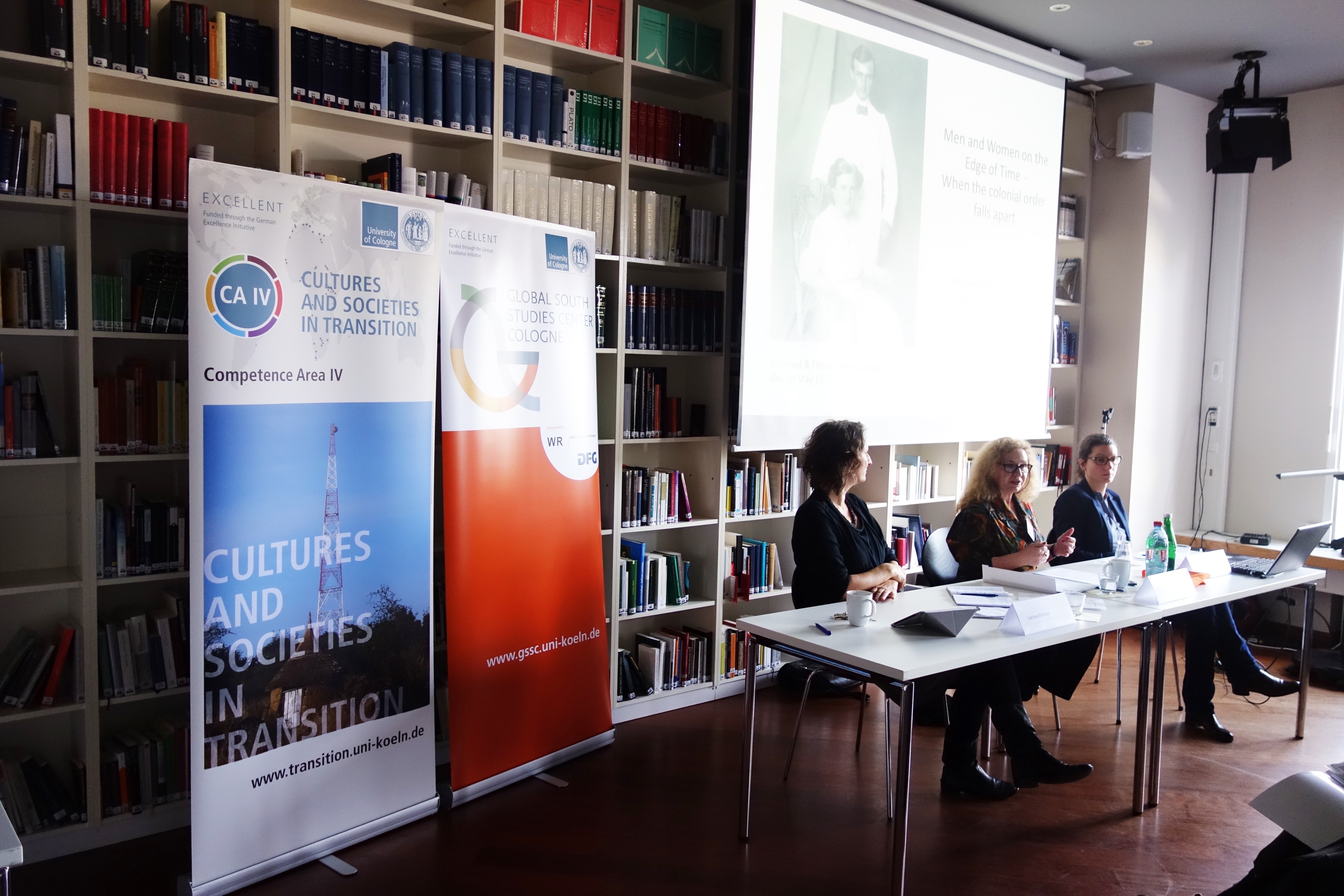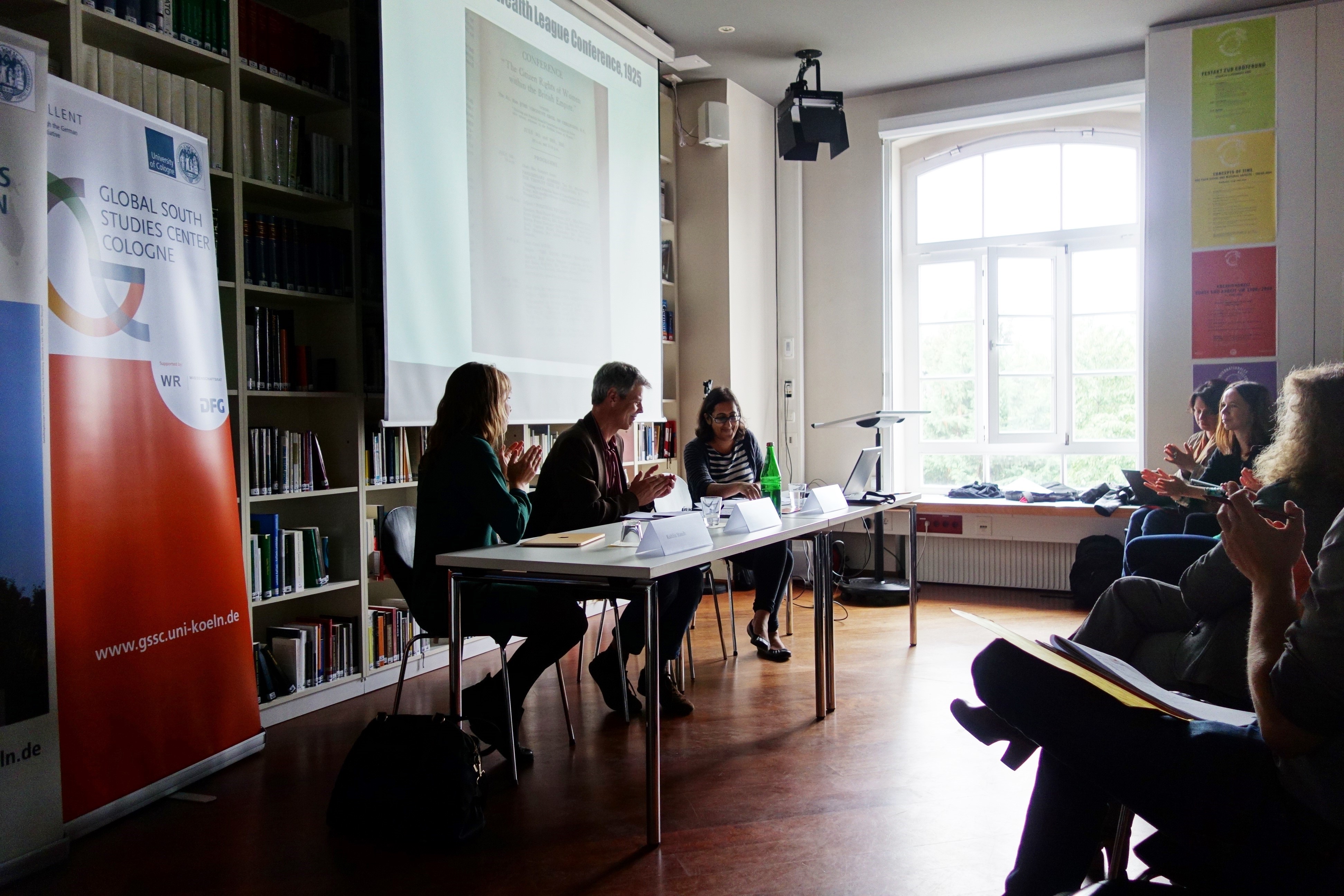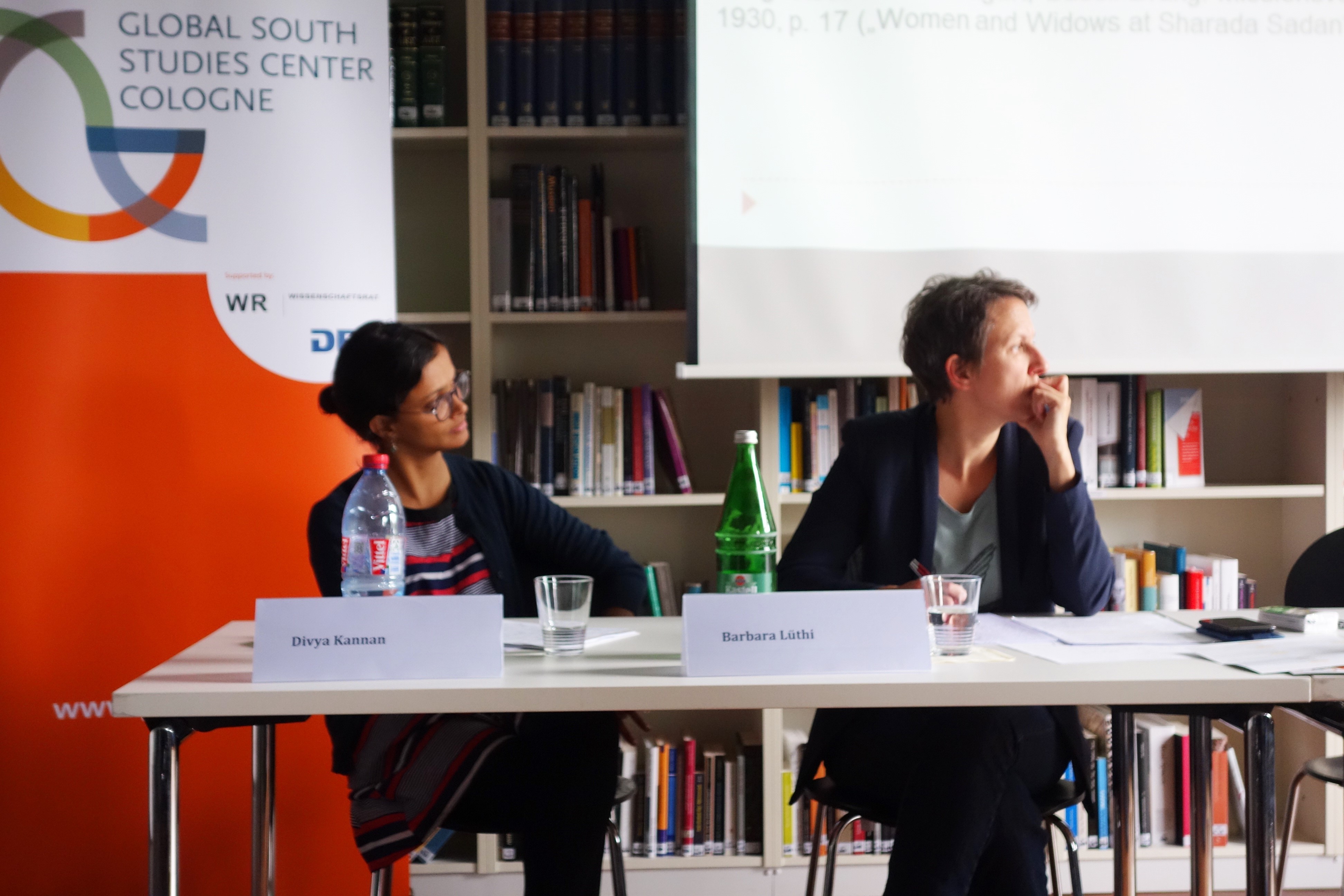Archiv
Vortrag: „Weißes Überlegenheitsdenken in Afrika, 1900–1914“
Vortrag im Rahmen des Kolloquiums des SFB 1288 „Praktiken des Vergleichens“ an der Universität Bielefeld, gehalten am 13. Dezember 2023. Weitere Informationen finden Sie hier.
Vortrag: „Kolonialismus im Deutschen Kaiserreich“
Eine Veranstaltung der Stiftung Bundespräsident-Theodor-Heuss-Haus am 14. Juli 2022.
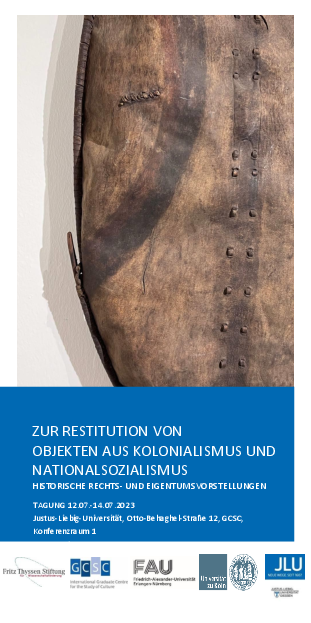
Workshop: Colonial Violence Beyond the Borders of Empires
Weiterführende Informationen zu dem Workshop finden Sie hier.
Weiterführende Informationen zu dem Workshop finden Sie hier.
Colonialism as Shared History. Past, Present, Future
Conference organized by Friedrich-Alexander Universität Erlangen-Nürnberg, Georg-August Universität Göttingen and Universität zu Köln, in cooperation with the Gerda Henkel Foundation and with support of the German Federal Foreign Office. Media partnership with Deutschlandfunk Kultur.
Convenors: Bettina Brockmeyer, Rebekka Habermas, Ulrike Lindner
‘Africa’, ‘Asia’ and ‘Oceania’ are no longer objects of European history and European decision-making. In the post-colonial age of globalization, we are facing an era of ever closer political, economic, social and cultural interdependence, but also strong ruptures in societies around the world. In order to better shape our future together, we also need to come to a common understanding of our history – in the sense of a shared history, although not necessarily assessed equally in all parts. We need political, cultural and academic exchanges, including disputes about the colonial past in order to come to a better mutual understanding of our colonial history and of the strong roots of racism.
Meanwhile controversial public debates about the colonial past have been going on for decades in almost all countries, the debate in Europe has intensified only recently. We are witnessing public debates about an entangled global history and the question of how to deal with the material and immaterial witnesses of such an interconnectedness. These debates take place in universities and museums, in theatres, literature and newspapers, in parliaments or civil society initiatives and on the streets. The focus lies on questions about the restitution of colonial objects, the impact of colonialism and racism, and different ways of reading history.
However, remembering and coming to terms with a shared history can only be successful if the demand for a discussion on equal terms does not remain an empty promise. To this end, it must be possible to create a diverse and heterogeneous space of memory, the arts, and research, which deepens existing cooperation and opens up new forms of cooperation.
The aim of the conference is, therefore, to bring together research, the arts and civil society – namely from the former colonies and Germany – in order to question the past, present and future of colonial memory. What could a shared history look like? The conference should help to concretize and set in motion co-operative research.
Museum Collections in Motion. Colonial and Postcolonial Encounters
15.-17.07.2019 - Conference organized by: University of Cologne, Bremen University, the Rautenstrauch-Joest-Museum Cologne and boasblogs. Convenors: Anna Brus, Larissa Förster, Michi Knecht, Ulrike Lindner, Nanette Snoep, Martin Zillinger
The growing public awareness of colonial violence and historical injustice has put ethnographic collections into the spotlight of social and political debates. Museums are increasingly confronted with the challenge to decolonize their exhibition practices and examine their collection history for looted art, colonial entanglements, and systematic exclusions. The recent initiative of French President Macron to explore the modalities for restituting African objects from French collections has opened a new chapter in the debate on restitution and repatriation. While its actual implementation remains to be seen, the report by Felwine Sarr and Bénédicte Savoy has set a world-wide agenda for decolonizing museum collections and academic research in the coming years.
In order to envision alternative futures for these collections and new forms of co-operation, this conference brings together activists, curators, experts, young researchers and scholars from around the world. Over three days we will re-visit museum collections and the debates and practices that have evolved around them, discuss ongoing work in the longue durée of colonial and postcolonial encounters and bring views from the Global North and South into intensive dialogue.
Kein Platz an der Sonne - (Post)koloniale Universitäts- und Stadtgeschichte
16.05.2019 - Podiumsdiskussion und Vorstellung von Initiativen zur kolonialkritischen Universitätsgeschichte - mit Marianne Bechhaus-Gerst, Larissa Förster, Anne-Kathrin Horstmann, Bebero Lehmann, Stefanie Michels; Moderation: Ulrike Lindner
Die Veranstaltung widmet sich einem wenig bekannten Aspekt der Geschichte der Kölner Universität: Schon an der Handelshochschule – dem Vorläufer der Kölner Universität – herrschte eine starke Kolonialbegeisterung: Verschiedene Professoren, Lehrende und Studierende engagierten sich in Kolonialvereinen, es wurden koloniale Inhalte gelehrt und sogar einige Expeditionen durchgeführt. Nach der Gründung der Universität zu Köln 1919 bestand die Kolonialbegeisterung trotz des Verlusts der Kolonien durch den Versailler Vertrag fort. Ein Teil der Studierendenschaft wie auch der Professorenschaft befürwortete kolonialrevisionistische Ziele; viele waren weiterhin in Kolonialvereinen engagiert. Es gab auch während der Zeit der Weimarer Republik jedes Semester fächerübergreifende Veranstaltungen zur Kolonialwissenschaft. Konrad Adenauer, der maßgeblich die Gründung der Universität vorangetrieben hatte, war selbst von 1931 bis 1933 geschäftsführender Vizepräsident der Deutschen Kolonialgesellschaft und hatte sich schon vorher stark im Kölner Verein der Kolonialgesellschaft engagiert. Die enge Verquickung der Universitätsgeschichte mit Kolonialismus und Kolonialrevisionismus wirft zahlreiche Fragen auf, die auf dem Podium diskutiert werden sollen.
The Camp: Disruptions of Space and Time in Labour and Refugee Camps
Black Germany 1880-1914
30.11-18.12.2017 - Exhibition organized by Robbie Aitken & Ulrike Lindner
Anhand ausgewählter Biographien, illustriert durch Fotos und bisher wenig beachtetes Archivmaterial, rekonstruiert die Ausstellung „Black Germany“ die Entwicklung der Schwarzen Diaspora in Deutschland zwischen 1880 und 1945. Damit ermöglicht die Ausstellung tiefere Einblicke in die Beweggründe, Umstände und Reiserouten, die Schwarze Männer und Frauen aus den einst deutschen Kolonien ins Kaiserreich führten. Es wird aufgezeigt unter welchen Bedingungen sie in der Weimarer Republik lebten und arbeiteten und welches Schicksal sie und ihre in Deutschland geborenen Kinder im Nationalsozialismus erfuhren.
Eröffnet wird die Ausstellung mit einer Podiumsdiskussion, die unter dem Titel „Erinnern/Vergessen: Die marginalisierte Geschichte Schwarzer Deutscher“ verschiedene Ansätze aufgreift, wie dieser bisher wenig beachteten Teil der deutschen Geschichte in die dominanten Geschichtsnarrative und die Erinnerungskultur wieder eingeschrieben werden kann.
GRAINES Summer School
Workshop: Europe and its Colonial Legacy
11.-12.12.2015 - Postcolonial Perspectives on Europe
Workshop in the project “Europe: une histoire globale. XVIII°-XX° siècles” financed with the support of CIERA, Paris
Organized by: Ulrike Lindner (University of Cologne)/Barbara Lüthi (University of Cologne)/Jakob Vogel (Sciences Po, Paris)
GSSC Public Lecture: Catherine Hall
28.10.2015 - Slavery and Freedom re-visited: or What is a Man?
Lecture by Catherine Hall within the
Public Lecture Series of the GSSC:
Conference: Gender and Empire
23.-26.09.2015 - Exploring Comparative Perspectives and Intersectional Approaches
Organized by: Ulrike Lindner (University of Cologne)/ Dörte Lerp (University of Cologne)
Workshop: The Changing Margins of Europe
05.-06.12.2014 - Frontiers and Demarcations of a Continent from the 18th to the 20th Century
Workshop in the project “Europe: une histoire globale. XVIII°-XX° siècles” financed with the support of CIERA, Paris
Organized by: Ulrike Lindner (University of Cologne)/Jakob Vogel (Sciences Po, Paris)
Workshop: Forms of Bonded Labour
23.-24.06.2014 - Conceptual approaches towards a new comparative research framework
Organized by: Ulrike Lindner/Sabine Damir-Geilsdorf/Gesine Müller/Michael Zeuske

